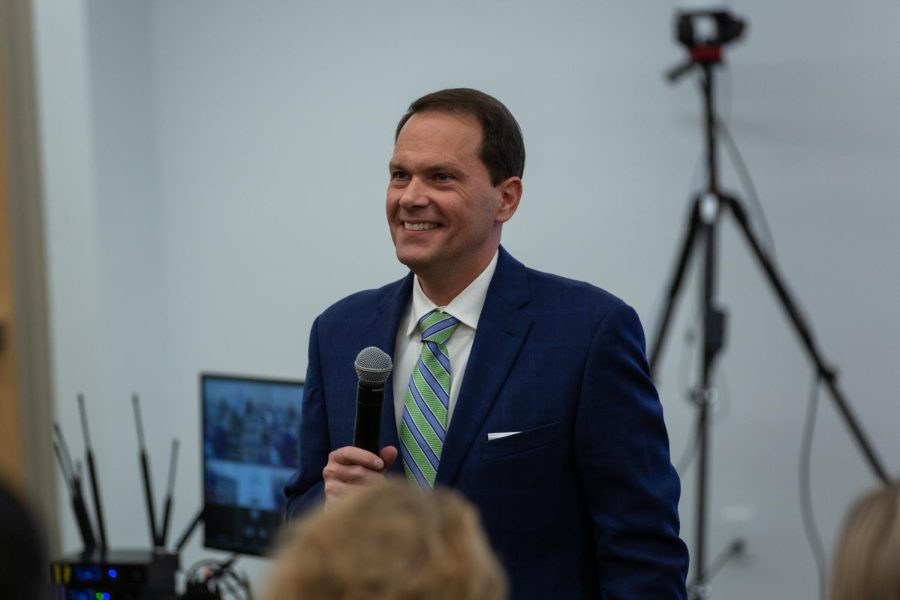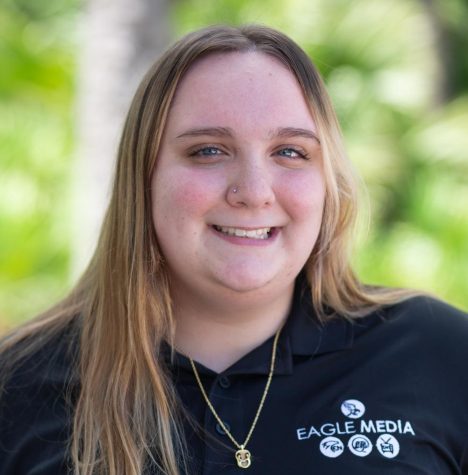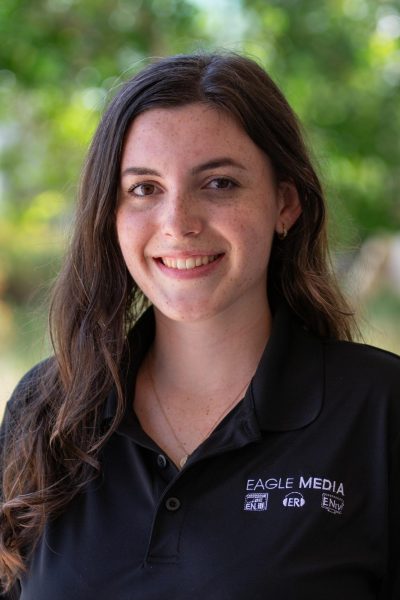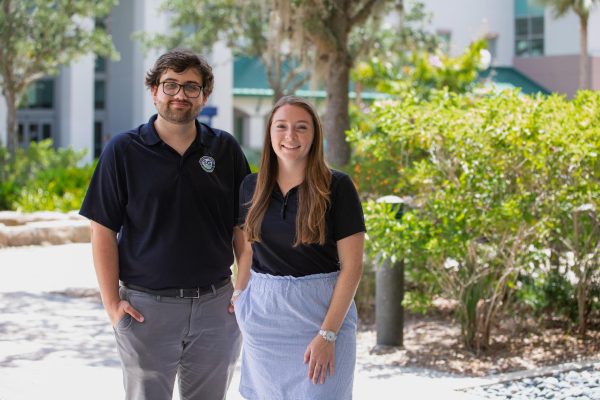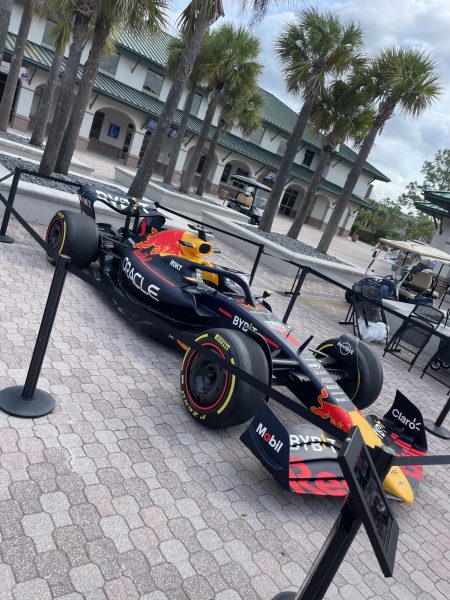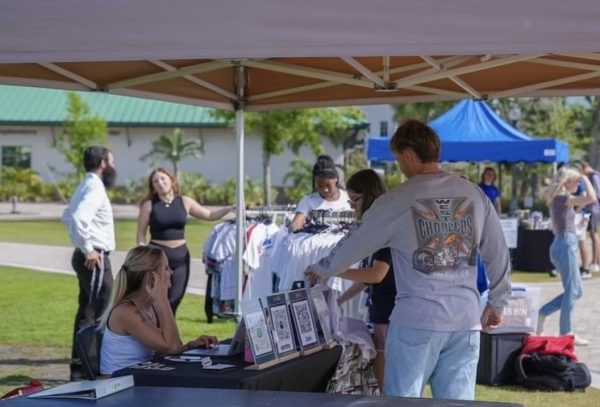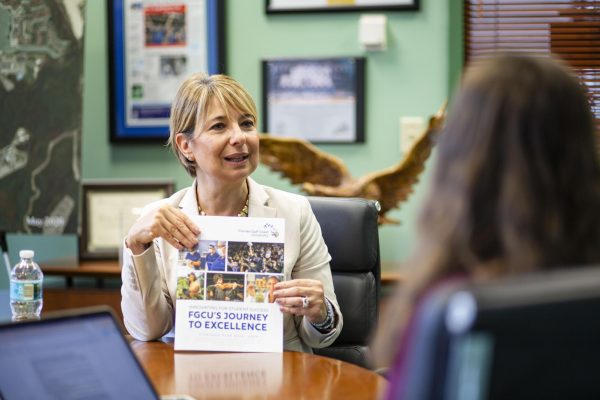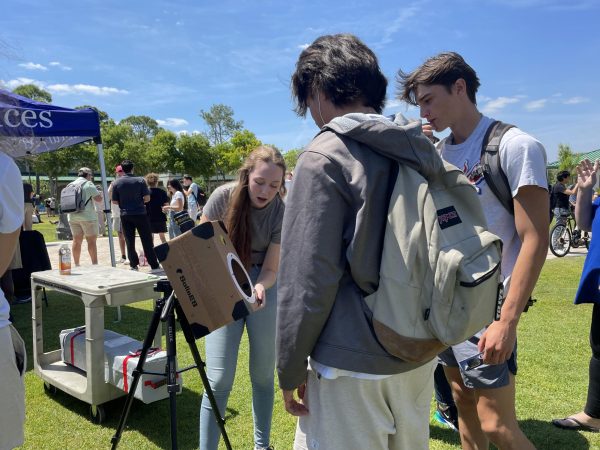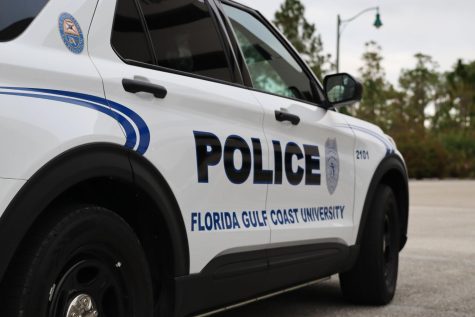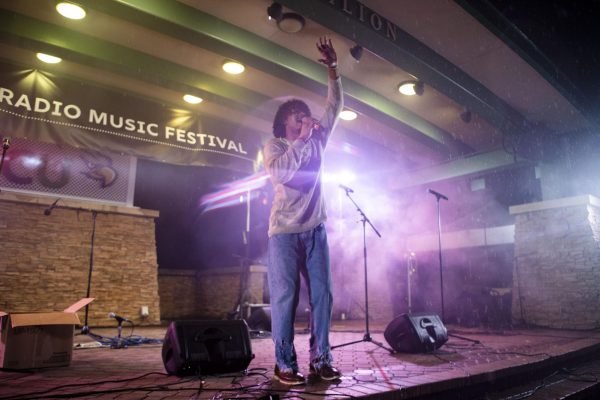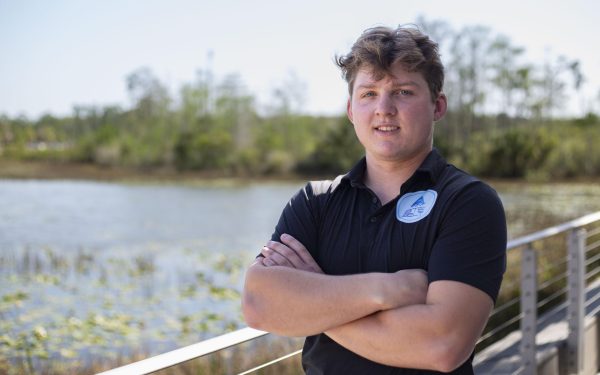Presidential Finalist Jay Morgan Wants FGCU to Gain Top 100 Status
The Last of Four Finalists to Host Public Forums
Dr. Joseph Morgan is hosting three public forums to converse with students, faculty and staff about FGCU’s future.
April 25, 2023
Joseph “Jay” Morgan, Ph.D. will attend three public forums held in the Water School on April 25 to give students, faculty and staff insight to his plan to have FGCU make it on the list of the top 100 national universities.
Morgan has been the president of Morehead State University in Kentucky since July 2017. He is the last of the four finalists to attend public forums for the continuation of the fifth presidential search.
Kristen Vanselow, the president of FGCU’s Staff Advisory Council and assistant vice president of Innovative Education and Partnerships, moderated the 8:30 a.m. to 9:30 a.m. public forum.
“I have a vision for Florida Gulf Coast University and it’s simple: to be a top 100 National University in the next six to seven years and by the year 2030,” Morgan said in his introduction. “I think we can do it. Do you want to be a brand? Or do you simply want to be a commodity? I want to be a brand, wanna be a brand any day.”
Morgan said he’s a strategic builder and values strategic planning.
“I’m not a disrupter, have been and never will be,” Morgan said. “But we’re gonna move the bar… You move it through goals and targets, and you move it through inspiring units to move forward and a collective vision. And one of the hardest things to do as president is to get all the constituencies, not just faculty, staff and students, all the constituency groups on board, alumni, foundations, donors, athletics, legislators, school superintendents, et cetera. and you build that collective vision and then the leadership follows.”
Top 100 University Goal
Dr. Clay Motley, dean of the College of Arts and Sciences, asked Morgan what FGCU would need to do during the seven year span to reach the goal of becoming a top 100 university.
Morgan said people can argue the ranking of the U.S. News and World Report results, but you can’t argue the metrics: class size, student success, graduation and retention rates and faculty pay.
He said that class sizes can come down a little, which he knows there’s economic realism with that goal, and the percentage of donors can increase. He said he’s achieved these goals at his current institution.
“About 2% of your alumni are donors. That needs to be about 8 or 9%. You might say that’s still low, no 8 or 9% is strong… [that’s] actually leading the pack,” Morgan said.
He also said FGCU is nearing the Hispanic-Serving Institution distinction as well.
“I’ve led a university that’s moved the mark tremendously before to be a top 15 institution in the South. I think we can do it again,” Morgan said.
Leadership Team
Moderator Vanselow asked Morgan how he would build his leadership team at FGCU. Morgan said he’s served under presidents that have a rapid fire turnover and he said that if he becomes president, it’ll be a calm transition. He said his current leadership team was built off of the needs of the institution.
“The way that I evaluate a team— and that is a team— is I look at what the strengths are, what the needs of the institution are and you begin to move the chips around a little bit,” Morgan said.
Journey Through Higher Ed. and Leadership Style
Dawn Kirby, an associate provost of Academic Programs and Curriculum Development, asked Morgan about his journey through academics from lecturer to president and how that informs his leadership style.
“You really understand what the heartbeat of the academy is, the joys and the frustrations of going through rank advancement,” Morgan said.
He said that although he may not be able to go around and talk about these joys and frustrations, he knows they exist and respects it.
Sustainability: Economic, Equitable and Environmental
Senior Rory “Cush” Cushen asked Morgan about his history with sustainability —economic, equitable and environmental— and if he has ideas to further that identity.
“Looking backward a little bit, my current institution, we pushed a lot of LEED certifications for our buildings. Your largest cost on a campus are personnel and plant and infrastructure. That’s a heavy, heavy cost,” Morgan said. “Hundreds of 1000s of dollars and a whole lot of energy to fuel all these buildings that we have on campuses.”
As president, he would continuously see if campus evolution is effective and efficient, gain LEED certifications, and evaluate programs and curriculums.
Enrollment and Community Importance
Lisa Johnson, the associate vice president of Enrollment Management, asked Morgan about enrollment at Morehead and what his values are to form a community within the university. Morgan said Morehead is strained in enrollment, much like the rest of the state and other regional public institutions. 40 teams go to area high schools to engage with the community.
“We’ve had to be creative,” Morgan said. “We’ve had to go outside of our state to surrounding states, Tennessee, West Virginia. Arkansas, Ohio, and Illinois, Indiana and the list goes on, to find that enrollment. Now, our incoming freshman classes have been okay. Steady, steady, graduate enrollment have suffered a little bit, probably because it’s been a pretty good environment economically and students necessarily don’t want to go back to school for a master’s degree or doctorate at the time.”
Regarding his values for an institution, he doesn’t tell faculty how to do their jobs. He said that he will make sure qualified people with terminal degrees are in the classroom and to have small classroom sizes.
“You’re trained professionals,” Morgan said. “I think it’s my job to kind of give the framework and the vision for the institution, little bit about degrees, talk a little bit about our students’ success and make sure the right channels are there. I don’t go around telling faculty what to do. You develop it, you’re in charge of the curriculum.”
Interactions With Stakeholders
An anonymous submitted question asked Morgan how he stays in touch with students, faculty and staff in his current role. He said that a presidential role requires him to be off campus more than he is on campus. He said he circulates for input, formally and informally at receptions, Student Government meetings, around campus or at sporting events.
“A president is going to circulate among donors, legislators, policymakers, schools. school superintendents, rotaries, chambers of commerce, financing corporate incorporations, on phone calls, with raters, accreditors, and the list goes on and on,” Morgan said. “And the point I’m making there is I’m restrained, that I make no pretense about it, time is strained.”
University-wide Respect
An anonymous submitted question asked Morgan what measures he’s taken in his career to create and develop a community of mutual respect.
“In my particular case, massive budget cuts all across our state in my first year as a president. I was ready to go back to the state system, quite honestly,” Morgan said. “I think what it began to exhibit to our campus is, I’m not here as a disrupter. I’m here to work through the challenges and the problems…My pledge was to work through them, to make sure that we got all the constituents on board to the degree that we could, moving in the same direction and making sure that their trust runs through the campus.”
Kentucky Colonel Award
A student named Cameron, 34, shared he is a non-traditional student at FGCU studying data analytics and asked how Morgan was awarded the Kentucky Colonel award, the highest honor bestowed by the governor of Kentucky, in 2011.
Morgan said that this isn’t a political award, anyone is able to nominate you based on merit. He said that a US congressman from the district he lived in nominated him.
“It is a little bit of a symbol of, not a statesmanship type award, but it means that there’s something noteworthy in nature that you’ve done or a project or initiative,” Morgan said. “And honestly, I don’t recall 10 or 12 years ago, what it was around, but I was nominated by a Congressman at one party to Governor of another party.”
Diversity, Equity and Inclusion
Dr. Chris Blakely, assistant vice president and dean of students in Campus Life and president of the Black Faculty and Staff Association, shared that research shows people of color within universities are often targets of race-based discrimination and harassment at predominately white institutions like FGCU. He asked Morgan what he would do to ensure FGCU’S BIPOC community is respected.
Morgan tells the audience that he and Dr. Blakely used to work together and he remembers begging Dr. Blakely to not leave their campus.
Morgan shares that he’s always tried to put policy and operational procedures to work by looking at three main groups on campus.
“Let’s start with the students. Related to kind of discriminatory practices for students, what I would always try to do on my current campus and would advocate for here at FGCU is number one kind of starting from the top,” Morgan said. “Do we have an admissions policy that creates any discriminatory practices? Are there testing procedures, or test requirements to get into the university or into any certain program that might be discriminatory toward any type of student.”
He said that next, he would constantly look at scholarship and discounting packages to make sure that there’s no discrimination within that. He would see if Under-Represented Minorities (URM) students have a fair opportunity to compete for scholarships.
Morgan said in regards to faculty and staff, he would ensure mentorship and that they’re encouraged to move through the ranks at a university.
Positive Public Relations
An anonymous submitted question asked Morgan how he would establish positive public relations between FGCU and the community.
“I feel like that’s the President’s job, is to get out and sell the university,” Morgan said. “Whether that‘s speaking to a group of seniors in a local high school, which I try to do 5,6, 7 times a year… Really set circulatory fashion where you’re collecting information, and you’re also selling the university, heading off problems occasionally, developing new initiatives raising money. I don’t see anything changing from what I do now.”
Morgan said in his closing statement that he likes FGCU’s spirit and its youthfulness is what attracted him to apply for presidency.
“I’m not looking for a new job, looking for a new adventure,” Morgan said. “And I think this is a great place to do it, and I feel it. I’ve got a long-term contract where I am, safe, with a wonderful board, a wonderful team, a wonderful campus. And this was a one-off for me. If I don’t get this, [my wife] Amber and I are going back home and that’s okay.”
Morgan’s last forum of the day will be from 4 p.m. to 5 p.m. in the Water School, room 106.
Public comments are encouraged through a survey that will remain open until Friday, April 28 at 5 p.m. All submissions are subject to public records and will be reviewed by the Board of Trustees before final interviews take place on Thursday, May 4 in the Cohen Student Union.
































